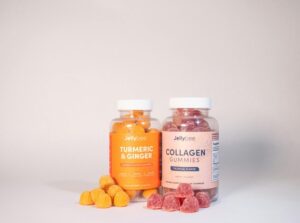
Collagen is indeed a protein, and it plays a crucial role in your body’s overall health, particularly in skin, hair, and muscles. This abundant protein provides structural support, contributing to skin elasticity and hydration. It also strengthens your hair and aids in muscle recovery. Understanding its functions can help you appreciate why collagen is essential for maintaining a youthful appearance and robust physical health. But what exactly makes collagen so vital?
What Is Collagen?
Collagen, often referred to as the body’s scaffolding, is the most abundant protein in humans and plays a crucial role in maintaining the structure and integrity of various tissues.
You’ll find collagen in skin, bones, tendons, and cartilage, where it provides strength and elasticity. This vital protein consists of amino acids, primarily glycine, proline, and hydroxyproline, which form long, fibrous chains.
These chains create a dense network that supports cellular structures and aids in tissue repair. As you age, collagen production declines, leading to common issues like wrinkles and joint pain. Understanding collagen’s importance can help you appreciate its role in overall health, encouraging you to consider ways to support your body’s collagen levels through diet and lifestyle choices. Collagen production declines by 1.5% annually after age 30, making it essential to consider supplementation.
The Structure of Collagen
The remarkable properties of collagen stem from its unique structure, which consists of three intertwined polypeptide chains forming a triple helix. This triple helix configuration provides structural strength and stability, allowing collagen to withstand significant tensile forces.
Each polypeptide chain is primarily composed of amino acids, with glycine, proline, and hydroxyproline being the most abundant. Their specific arrangement contributes to collagen’s rigidity and flexibility, essential for its role in various tissues.
Additionally, the presence of hydrogen bonds between the chains further enhances the stability of the helix. Understanding collagen’s structure is crucial for appreciating how it supports skin elasticity, joint functionality, and overall musculoskeletal health, making it a vital protein in your body.
Types of Collagen and Their Functions
Various types of collagen exist, each serving distinct functions throughout the body.
The most prevalent type, Type I collagen, is crucial for skin, bone, and tendon strength.
You’ll find Type II collagen mainly in cartilage, providing cushioning in joints.
Type III collagen supports the structure of muscles, blood vessels, and organs, often working alongside Type I.
Type IV collagen plays a key role in forming the basement membranes, essential for cellular support.
Lastly, Type V collagen contributes to the development of hair and the placenta.
Understanding these types helps you appreciate how collagen supports overall health and maintains the integrity of various tissues, allowing for effective healing and resilience against aging.
Natural Sources of Collagen
Incorporating natural sources of collagen into your diet can significantly benefit your overall health. Foods rich in collagen include bone broth, which is made by simmering animal bones and connective tissues, extracting collagen into a nutrient-dense liquid.
Additionally, fish, particularly those with skin, are excellent sources, as their skin contains high levels of collagen. Poultry, like chicken, is another great option, as it’s packed with connective tissues.
Don’t forget about plant-based sources; foods rich in vitamin C, such as citrus fruits, berries, and leafy greens, help stimulate your body’s collagen production. Nuts and seeds also provide essential amino acids necessary for collagen synthesis.
Incorporating these foods into your diet can enhance your collagen levels effectively.
The Role of Collagen in Skin Health
As you age, collagen production naturally declines, leading to noticeable changes in your skin’s appearance and health.
Collagen plays a crucial role in maintaining your skin’s elasticity, hydration, and overall structure. It’s the primary protein that supports your skin’s firmness, helping to reduce the appearance of fine lines and wrinkles.
Studies show that lower collagen levels contribute to sagging skin and uneven texture. By incorporating collagen-rich foods or supplements into your diet, you can potentially counteract these effects.
Additionally, topical treatments containing collagen or peptides may enhance skin hydration and promote a youthful glow. Prioritizing collagen in your skincare routine can significantly improve your skin health, providing the necessary support for a vibrant, resilient complexion.
Collagen’s Impact on Hair and Muscle
While collagen’s role in skin health is well-known, its benefits extend beyond just your complexion.
Collagen is vital for hair strength and growth, as it provides the necessary structure for hair follicles. Studies indicate that adequate collagen levels can promote hair thickness and reduce hair loss, enhancing your overall hair health.
In terms of muscle health, collagen contributes to muscle mass and strength. It’s a crucial component of muscle tissue, and research suggests that collagen supplementation can aid in muscle recovery after exercise.
This protein supports the integrity of tendons and ligaments, reducing the risk of injuries during physical activity. By maintaining healthy collagen levels, you can support both your hair and muscle vitality, enhancing your overall well-being.
Exploring Collagen Supplements and Their Effectiveness
When considering ways to enhance your health, collagen supplements have gained significant attention for their potential benefits. Research suggests these supplements may improve skin elasticity, reduce wrinkles, and even support joint health.
Collagen peptides, the most common form, are easily digestible and can be incorporated into various diets. Studies have shown that regular intake can lead to noticeable improvements in skin hydration and overall appearance.
However, results can vary based on individual factors like age and lifestyle. It’s essential to choose high-quality products and consult a healthcare professional before starting any supplement regimen.
While they hold promise, collagen supplements should complement a balanced diet and healthy lifestyle for the best results.






